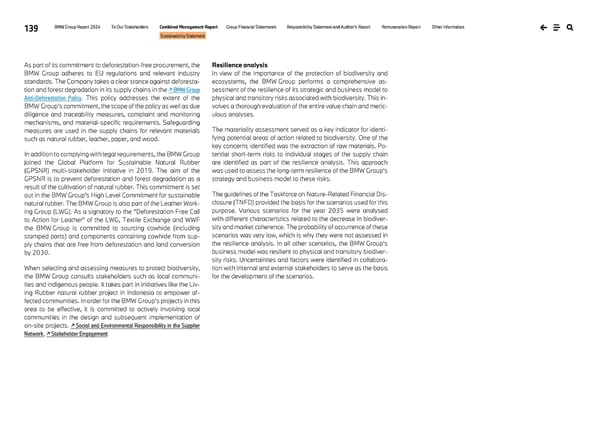139 BMW Group Report 2024 To Our Stakeholders Combined Management Report Group Financial Statements Responsibility Statement and Auditor’s Report Remuneration Report Other Information Sustainability Statement As part of its commitment to deforestation-free procurement, the BMW Group adheres to EU regulations and relevant industry standards. The Company takes a clear stance against deforesta- tion and forest degradation in its supply chains in the ↗ BMW Group Anti-Deforestation Policy. This policy addresses the extent of the BMW Group’s commitment, the scope of the policy as well as due diligence and traceability measures, complaint and monitoring mechanisms, and material-specific requirements. Safeguarding measures are used in the supply chains for relevant materials such as natural rubber, leather, paper, and wood. In addition to complying with legal requirements, the BMW Group joined the Global Platform for Sustainable Natural Rubber (GPSNR) multi-stakeholder initiative in 2019. The aim of the GPSNR is to prevent deforestation and forest degradation as a result of the cultivation of natural rubber. This commitment is set out in the BMW Group's High Level Commitment for sustainable natural rubber. The BMW Group is also part of the Leather Work- ing Group (LWG). As a signatory to the “Deforestation Free Call to Action for Leather” of the LWG, Textile Exchange and WWF the BMW Group is committed to sourcing cowhide (including stamped parts) and components containing cowhide from sup- ply chains that are free from deforestation and land conversion by 2030. When selecting and assessing measures to protect biodiversity, the BMW Group consults stakeholders such as local communi- ties and indigenous people. It takes part in initiatives like the Liv- ing Rubber natural rubber project in Indonesia to empower af- fected communities. In order for the BMW Group’s projects in this area to be effective, it is committed to actively involving local communities in the design and subsequent implementation of on-site projects. ↗ Social and Environmental Responsibility in the Supplier Network, ↗ Stakeholder Engagement Resilience analysis In view of the importance of the protection of biodiversity and ecosystems, the BMW Group performs a comprehensive as- sessment of the resilience of its strategic and business model to physical and transitory risks associated with biodiversity. This in- volves a thorough evaluation of the entire value chain and metic- ulous analyses. The materiality assessment served as a key indicator for identi- fying potential areas of action related to biodiversity. One of the key concerns identified was the extraction of raw materials. Po- tential short-term risks to individual stages of the supply chain are identified as part of the resilience analysis. This approach was used to assess the long-term resilience of the BMW Group’s strategy and business model to these risks. The guidelines of the Taskforce on Nature-Related Financial Dis- closure (TNFD) provided the basis for the scenarios used for this purpose. Various scenarios for the year 2035 were analysed with different characteristics related to the decrease in biodiver- sity and market coherence. The probability of occurrence of these scenarios was very low, which is why they were not assessed in the resilience analysis. In all other scenarios, the BMW Group’s business model was resilient to physical and transitory biodiver- sity risks. Uncertainties and factors were identified in collabora- tion with internal and external stakeholders to serve as the basis for the development of the scenarios.
 BMW Group Report 2024 Page 138 Page 140
BMW Group Report 2024 Page 138 Page 140